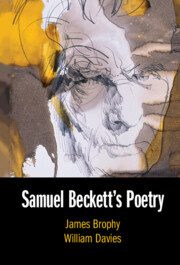Book contents
- Samuel Beckett’s Poetry
- Samuel Beckett’s Poetry
- Copyright page
- Contents
- Notes on Contributors
- Acknowledgements
- Abbreviations
- Introduction
- Chronology of Samuel Beckett’s Poetry
- Chapter 1 Weirdness and Dislocation in Beckett’s Early Poetry
- Chapter 2 Whole Fragments
- Chapter 3 Pre-echoing the Bones
- Chapter 4 ‘The Nucleus of a Living Poetic’
- Chapter 5 Beckett Growing Gnomic
- Chapter 6 Gender, Pronoun and Subject in ‘Poèmes 1937–1939’
- Chapter 7 The Missing Poème
- Chapter 8 Romanticism and Beckett’s Poetry
- 9 Romance under Strain in ‘Cascando’
- Chapter 10 Samuel Beckett’s Self-Translated Poems
- Chapter 11 Samuel Beckett’s Translations of Mexican Poetry
- Chapter 12 Beckett’s Poetry and the Radical Absence of the (War) Dead
- Chapter 13 Beckett’s Sound Sense
- Chapter 14 The Matter of Absence
- Chapter 15 ‘Mocked by a Tissue That May Not Serve’
- Chapter 16 Invoking Beckett
- Index
Chapter 2 - Whole Fragments
Beckett and Modernist Poetics
Published online by Cambridge University Press: 15 December 2022
- Samuel Beckett’s Poetry
- Samuel Beckett’s Poetry
- Copyright page
- Contents
- Notes on Contributors
- Acknowledgements
- Abbreviations
- Introduction
- Chronology of Samuel Beckett’s Poetry
- Chapter 1 Weirdness and Dislocation in Beckett’s Early Poetry
- Chapter 2 Whole Fragments
- Chapter 3 Pre-echoing the Bones
- Chapter 4 ‘The Nucleus of a Living Poetic’
- Chapter 5 Beckett Growing Gnomic
- Chapter 6 Gender, Pronoun and Subject in ‘Poèmes 1937–1939’
- Chapter 7 The Missing Poème
- Chapter 8 Romanticism and Beckett’s Poetry
- 9 Romance under Strain in ‘Cascando’
- Chapter 10 Samuel Beckett’s Self-Translated Poems
- Chapter 11 Samuel Beckett’s Translations of Mexican Poetry
- Chapter 12 Beckett’s Poetry and the Radical Absence of the (War) Dead
- Chapter 13 Beckett’s Sound Sense
- Chapter 14 The Matter of Absence
- Chapter 15 ‘Mocked by a Tissue That May Not Serve’
- Chapter 16 Invoking Beckett
- Index
Summary
Samuel Beckett’s writing career is inextricably bound up in the idea of modernism: he was deeply attentive to literary and artistic history, eager to learn from the radical experiments of his elders, and sensitive to the aesthetic projects of his peers. He was implicated in the development of modernist poetics: its roots in Rimbaud and Baudelaire, its avant-garde practices in Eliot, Stein and Pound, and its grappling with loss and belatedness in Denis Devlin and Thomas MacGreevy. His activities as a translator also reflect these perceptions and interests, providing him with a wider range of perspectives by which to evaluate poetic form, such as how Spanish and South American poetry might be positioned against French and English modernist poetics. Beckett’s extensive poetic knowledge plays little obvious part in most of his novels, plays and short prose texts, save for the occasional poetic interjection. Yet these poetic devices are turned to effect in his later prose, where prose rhythm performs a critical poetics, and literary allusion – fragmentary and submerged – begins to align into a sustained meditation on the value of poetic history. This belatedness fits with Beckett’s anointment as a Late Modernist, where his poetic touchstones tend to be medieval, Elizabethan and Romantic rather than High Modernist. Beckett’s relation to modernist poetics is uneven, fragmented and complicated in its historicity and genealogy, yet in shaping his early poetry and later prose its influence is evident in the contours of his long writing career.
- Type
- Chapter
- Information
- Samuel Beckett's Poetry , pp. 39 - 53Publisher: Cambridge University PressPrint publication year: 2022



